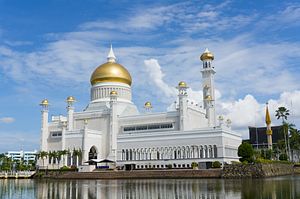Brunei intends to introduce in the near future sweeping changes to its legal system, adding a heavy dose of Islam and moving the country closer to Afghanistan, Pakistan and about a dozen other countries in the world where Sharia law is widely enforced.
Under Brunei’s Sharia law system, practices considered barbaric and illegal by some, like the stoning to death of adulterers and the amputation of limbs for theft, will be enshrined in the state’s legal system. Also banned is the propagation of religions other than Islam or atheism. The offense will carry a $20,000 fine and or a prison term of up to five years.
This has compromised the 30,000 Filipinos living in Brunei and prompted a warning from a Catholic priest in the tiny, oil-rich sultanate that there will be no baptisms.
“There will be no baptisms. There is not a lot we can do about it. We will have to wait and see what happens,” he told Britain’s Independent newspaper.
Schools have also been warned that children are not to be exposed to any religion, be it it through ceremonies or acts of worship, but Islam and that non-Muslims would be subjected to some aspects of the new laws. It was not clear exactly what parts of Sharia law would be imposed on non-Muslims.
However, analysts—who declined to be named—said this would not necessarily stop people, including members of Brunei’s all important royal family, from straying.
Members of the family have a flamboyant history that would no doubt cause a great deal of consternation within the Sharia courts system. This could test respect for the Sultan and his family elsewhere in the world, particularly in the West, which has made the royal family among the richest in the world from decades of oil purchases.
Among them is the former wife of the Sultan Hassanal Bolkiah. A London court has heard how Mariam Aziz lost half-a-million pounds playing the tables at English casinos. She denied having once gambled away three million pounds in a single spree.
The Sultan has hit back at international criticism of the introduction of Sharia law, saying he hoped that people outside of Brunei would respect his subjects “in the same way that we respect them,” adding that the Islamic dictates were in fact a special guidance from God. He has threatened legal action against anybody criticizing the new laws, which he adds will provide a firewall against threats posed by globalization, and says such people “can no longer be given the liberty to continue with their mockery.”
The laws also highlight the great cultural and religious divides among the 10 countries that form the Association of Southeast Asian Nations (ASEAN). The bloc includes predominantly Catholic Philippines, and Communist Vietnam and Laos. Islam also dominates Malaysia and Indonesia, while Cambodia, Thailand and Myanmar are for the most part Buddhist.
The bloc intends to launch the ASEAN Economic Community (AEC) by the end of 2015, consisting of a single market and production base that will take the region into an unprecedented era of globalization and result in a significant increase in cross-border trade and labor migration.
How Brunei copes with a further merging of the regional economies with its cultural and religious practices could provide the first litmus test of the AEC’s success or failure.
Luke Hunt can be followed on Twitter @lukeanthonyhunt

































